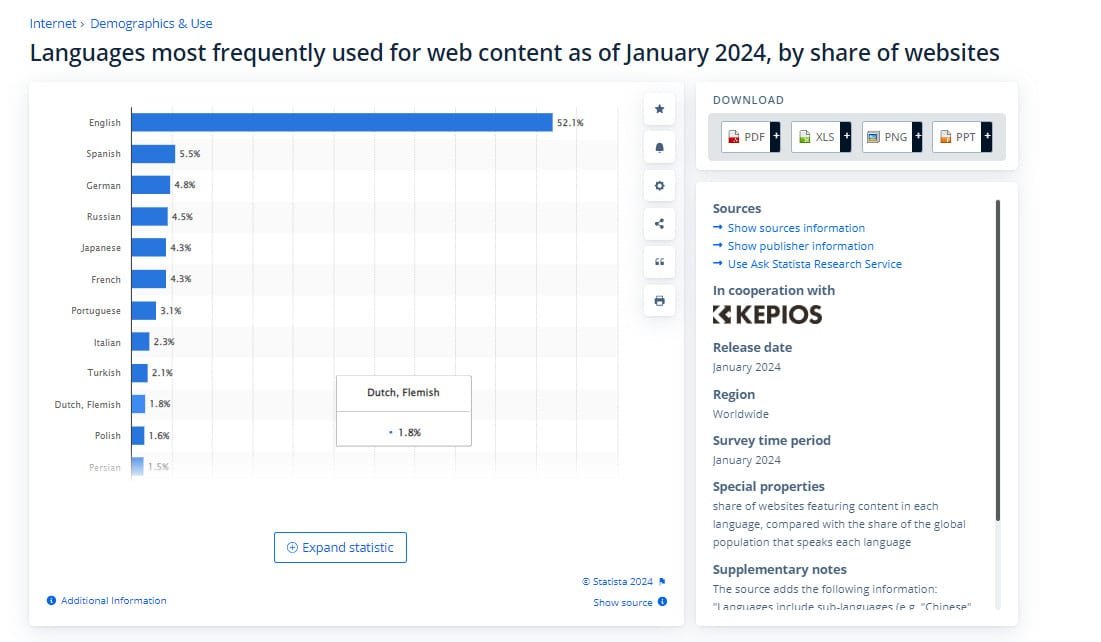For businesses that operate primarily in English-speaking markets, expanding into countries where English is not widely spoken can be a huge opportunity.
This is especially true for businesses that sell online. Currently, 26% of online content is written in English, meaning that non-English websites have much less competition for traffic.
How to Select Keywords
One of the most daunting parts of launching an online business into a non-English speaking market is keyword research.
When conducting keyword research in our native language, we lean heavily on our ability to understand small, nuanced meanings between ostensibly similar keywords.
When working in an unfamiliar language, we cannot do this. We, therefore, need to look at cues beyond the words themselves to determine whether keywords are worth going after, both in terms of volume, potential profitability, and level of competition.
Here is a guide on how to do this.
Look at What Your Competitors Have In Their Title Tags to Discover the Best Version of a Keyword to Target
The most common source of mistakes when performing keyword research in a language that we are unfamiliar with is choosing keywords based on direct translations of our native language.
Instead, you need to target keywords that people in your chosen language actually search.
We know from experience that people often do not make searches using formal language.
Rather, the language that we use when making searches is generally closer to how we speak – often incorporating slang and colloquialisms.
Direct translations using tools like Google Translate will therefore only take you so far, and can often lead to selecting keywords that are the less commonly searched versions of a given term.
The Problem With Direct Translations of Keywords
Let’s use the lucrative keyword: “best washing machines”. If someone were to rank well for this keyword, they could make a lot of money either selling their own or third-party washing machines.
If we directly translate this keyword into French (for example) we are given the keyword: “meilleures machines à laver”.
Now, if we enter this keyword into Google.fr (with our browser language set to French, you can find out how to do this here) we see the following results:
As you can see here, all the pages ranking for this term are actually using the keyword: “meilleurs lave-linges”.
In the vast majority of cases, these pages will be written and optimized by native French speakers, so you can be confident that they are using the most commonly searched version of the keyword that you’re after.
Compare Relative Keyword Volumes Across Countries
If you do not have a deep understanding of the language and culture that you are performing keyword research in, you are more beholden to relying on tools to assess interest in given keywords.
Using Keyword Tools
Keyword tools offer an estimate of the monthly search volume of any given keyword.
More advanced keyword tools offer you the ability to drill down into this volume data by country and collect data on non-English language keywords.
The problem with relying on keyword tools is that their data is inaccurate.
No keyword tool has access to actual Google search data, and they, therefore, base their data on third-party providers (generally Clickstream).
Comparing Keyword Volumes
Although keyword volume cannot be trusted on a literal basis, the way that keyword tools measure search volume is consistent across different locations and languages.
This means that you can accurately compare keyword volumes as proportions from one country to another.
Consequentially, if you understand the amount of demand for a certain keyword in your native language, you can work out the demand for that keyword in a foreign market based on looking at keyword metrics as a proportion from one location to another.
Content in Languages Other Than English
A final note on keyword volume – it’s worth taking into account the fact that there is far less content published online in other languages compared to English.
Therefore, even if there is a lower overall volume for a given keyword, you may end up with more traffic as your chances of ranking near the top of search engine results pages are much higher.
You should take the proportions of competition for keywords (shown below) into account when deciding whether there is enough keyword volume for you to go after.
Image sourced from: https://www.statista.com/statistics/262946/share-of-the-most-common-languages-on-the-internet/
Be Willing to Tweak and Optimize as You Go
Given that our ability to make educated guesses about what keywords we should optimize for is reduced when working in a second language, we need to be more reliant on actual data to inform our decisions.
Once you have a website up and running, you can use Google Search Console to tell you exactly what people are searching for to find each page on your website. This information does not come from (unreliable) third-party databases, but rather from actual Google user data.
Having access to this real data puts you on the same footing as someone who is working in their native language – you both have access to authentic native language data. Where you lag behind is the additional guesswork that is needed to take you to this point.
Keyword research in a non-native language, therefore, you need a shift in mindset when starting a website.
Rather than trying to get keyword research perfect before a website is even up, you want to aim towards getting a site ranking in the right ballpark as far as keywords are concerned, and then do your true research based on data from Google Search Console.
Work With a Translator to Verify Your Keywords
Although high-quality keyword research in an unfamiliar language is possible, it can be incredibly time-consuming.
With all the best will in the world, it’s very easy for mistakes to creep into your keyword selection that a native language speaker can spot in an instant.
Therefore, it is always worth working with a professional translator to help verify your final keyword selection.
Translators can also be kept on to help you with content creation in your chosen language, and having an understanding of the keywords that you are targeting with your content can result in a better final product overall.
The Takeaway
These days, most people understand the impact keywords have on a business’ online success, so it’s crucial that you get it right when launching a website in a new language.
There are plenty of tools and professionals to assist you in this goal, you just have to know which ones to trust.
BeTranslated is a reliable translation agency with a team of experienced native translators and a strong focus on SEO translation.
For more information or a free, no-obligation quote, contact us today.







